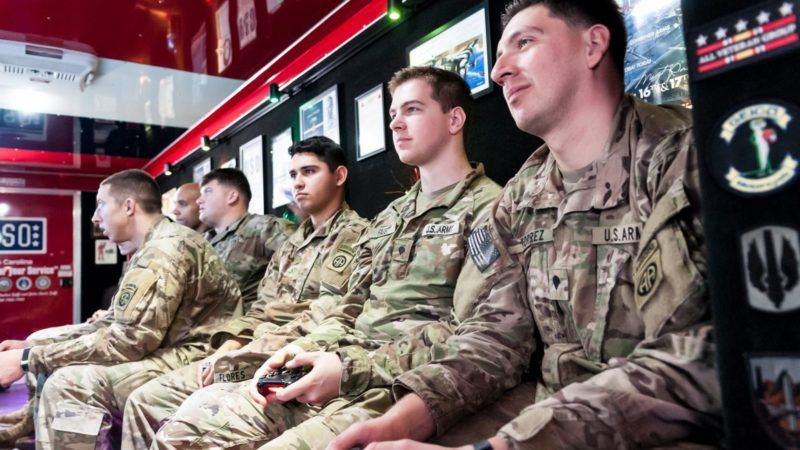The Army Tries To Use Esports as a Recruiting Tool, Gets Trolled, Grabs the Banhammer
By kicking out critics on Twitch and Discord, is the military running afoul of the First Amendment?

If you're a gamer (and possibly even if you're not), you know about the livestreaming platform Twitch. It is the preeminent platform for streaming video games for an audience. Amazon bought it in 2014 for $960 million and has thus far stayed well ahead of attempts by other platforms, such as Steam and YouTube, to undercut its market dominance.
Since 2018, the U.S. military has taken an interest in Twitch—and the wider world of "esports," or competitive video gaming—as a potential recruiting tool. The Army launched an esports team, and the Navy and Air Force followed suit. (The Marines declined, telling Military.com that they didn't want potential recruits to see war as being "gamified.") But while combat-oriented games may be popular on Twitch, it doesn't necessarily follow that gamers are looking for opportunities to joined the armed forces—or even that they support America's wars. And so military streamers have had to deal with people showing up in the chats on USArmyEsports, the Army's official Twitch channel, asking impertinent questions about war crimes. The streamers have been responding by booting them from chat.
One of the trolls, Jordan Uhl, subsequently wrote at The Nation about getting banned from USArmyEsports chats after posting a link to a Wikipedia page on U.S. war crimes. Vice took note last week of commenters attempting to troll the chat with questions like "What's your favorite war crime?" and getting banned. Similar bans are taking place in the Army esports' chat channels on another platform, Discord.
For most Twitch streamers, there's nothing unusual about having to ban trolls from chat. Because Twitch is so exceedingly popular, it's almost mandatory that Twitch streamers boot out people who fill the chat channel with spam or suspicious links or bigoted comments. The top streamers all have their own teams of moderators to help keep chat from getting out of control.
But because this Twitch stream is sponsored by the U.S. military, there's an interesting dilemma here: Is banning somebody from its chat channel unconstitutional censorship of speech?
Vice writer Matthew Gault asked a couple of experts on the matter. Both Vera Eidelman of the American Civil Liberties Union and Katie Fallow of the Knight First Amendment Institute told him that banning comments on a Twitch channel overseen by the government could run afoul of some recent court precedents involving Twitter.
The Knight Institute sued President Donald Trump in 2017 for blocking people from following his Twitter feed when they tweeted things at him that he didn't like. The institute argued that because Trump ran his Twitter feed as an official "interactive space" for informing the public, it was unconstitutional to block people's communications to him just because he didn't like what they were saying.
The Knight Institute won the suit, arguably creating a precedent for other situations when government representatives might want to ban or block commenters online. "If the Army-run Twitch channel is a public forum, then deleting comments or blocking people from commenting based on their viewpoints, such as asking about military crimes, would violate the first amendment," Fallow told Vice.
An Army representative countered that it was banning people for violating Twitch's harassment rules, not because of their comments' political content. Eidelman took a dim view of that claim, pointing out to Gault that the Army streamers generally allowed people to say what they wanted in chat but banned anybody saying anything that appeared critical of the military and its recruiting tactics.
"And that's exactly what the government can't do in a forum that it designates," Eidelman argued. "The government cannot constitutionally prohibit speech on the basis of viewpoint. And it looks like that's exactly what it did here."
Since this blowup last week, the USArmyEsports Twitch channel has been quiet. A look at the stream's video archives shows that it had been streaming games nearly daily for the past couple of months. But its last stream was on July 9—around the time that press coverage about the Army banning commenters started to escalate.
Uhl frames his objections to the military using Twitch and esports as a recruiting tool as outrage over targeting teens. This is, of course, how military recruiting has always worked. (There was even an episode of The Simpsons about it!) I'm shocked that it took until 2018 for the military to figure out that esports might be fertile recruitment territory.
But because of social media and other online tools, government propaganda is no longer a one-sided communications from them to us. Members of the public are more able to respond in real time, immediately, to the messages that the government send our way. And others are able to see it. Social media reduces recruiters' ability to avoid criticism.


Show Comments (30)